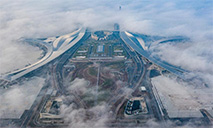Interview: RCEP offers new economic opportunities for inclusive, balanced growth -- Malaysian business expert
KUALA LUMPUR, Jan. 7 (Xinhua) -- The Regional Comprehensive Economic Partnership (RCEP), the world's largest free trade pact, will provide new opportunities for more inclusive and balanced growth, a Malaysian business observer said.
Among the many benefits of RCEP will be the transfer of technology and production capacity from developed countries to less developed ones, as the former seek to build up new markets, Associated Chinese Chambers of Commerce and Industry of Malaysia (ACCCIM) deputy secretary-general Michael Chai Woon Chew told Xinhua in a recent interview.
"The more developed country invests in less developed countries. It helps to increase the economic output and improve income level, enhance the purchasing power to buy more goods and services from (the) more developed economy and vice versa," Chai said.
"So you have technology transfer. People become richer. They can buy more, then the trade will develop more balanced in that sense," he said, adding that such trends had already been noted when ASEAN (the Association of Southeast Asian Nations) launched its economic community in 2015, leading to greater regional economic growth.
Chai also said that RCEP also posed certain challenges, mainly on how businesses in participating countries need to educate themselves on the rules and to recognize the opportunities that RCEP offers them. It also urged close cooperation between governments, business associations and chambers of commerce to fully take advantage of the agreement.
Chai said that he talked with a lot of business people who said they didn't do export business and RCEP had nothing to do with them. "But think about it. If products from other countries are coming into Malaysia, which will actually affect the local businesses as well, how do we prepare for it?"
"We will face competition, especially in terms of costs and product competitiveness. So this is something whereby the government, as well as the chambers, can help the local businesses as to how to be more competitive, how to take on the challenge," he said.
Chai said countries, such as Malaysia would receive a much needed economic boost following the economic disruption brought by the COVID-19 pandemic over the past two years, explaining the reduction of trade barriers including lower tariffs and greater integration would be a boon for the country.
"So it's been a very tough two years for businesses and with this RCEP coming into being, tariff elimination, market liberalization, as well as trade facilitation will help the countries that have been impacted by (the) pandemic to recover," he said.
"With Malaysia, our open trade position will be greatly enhanced by increased market integration with reduced trade barriers, enhanced trade facilitation. Malaysia stands to benefit in terms of our geographical location especially for market access for participating countries supported by better trade facilitation to lower transaction costs for businesses and investors," he said.
RCEP, which took effect on Jan. 1 this year, is made up of 10 ASEAN members, as well as China, Japan, South Korea, Australia and New Zealand, covering about 30 percent of the world's population, as well as its gross domestic product and trade volume.
While Malaysia is a signatory, it has yet to ratify the pact due to delays in its parliamentary proceedings caused by the COVID-19 situation in the country. RCEP is expected to be ratified when the lower house of the Malaysian parliament convenes in February.
Photos
Related Stories
- Interview: RCEP to boost ASEAN's post-pandemic economic recovery, says Malaysian analyst
- Malaysia's durians, other agricultural exports to see boost under RCEP trade agreement
- RCEP officially enters into force on first day of 2022
- Openness and integration are an unstoppable trend of history
- RCEP fuels new hopes for region's growth
Copyright © 2022 People's Daily Online. All Rights Reserved.










